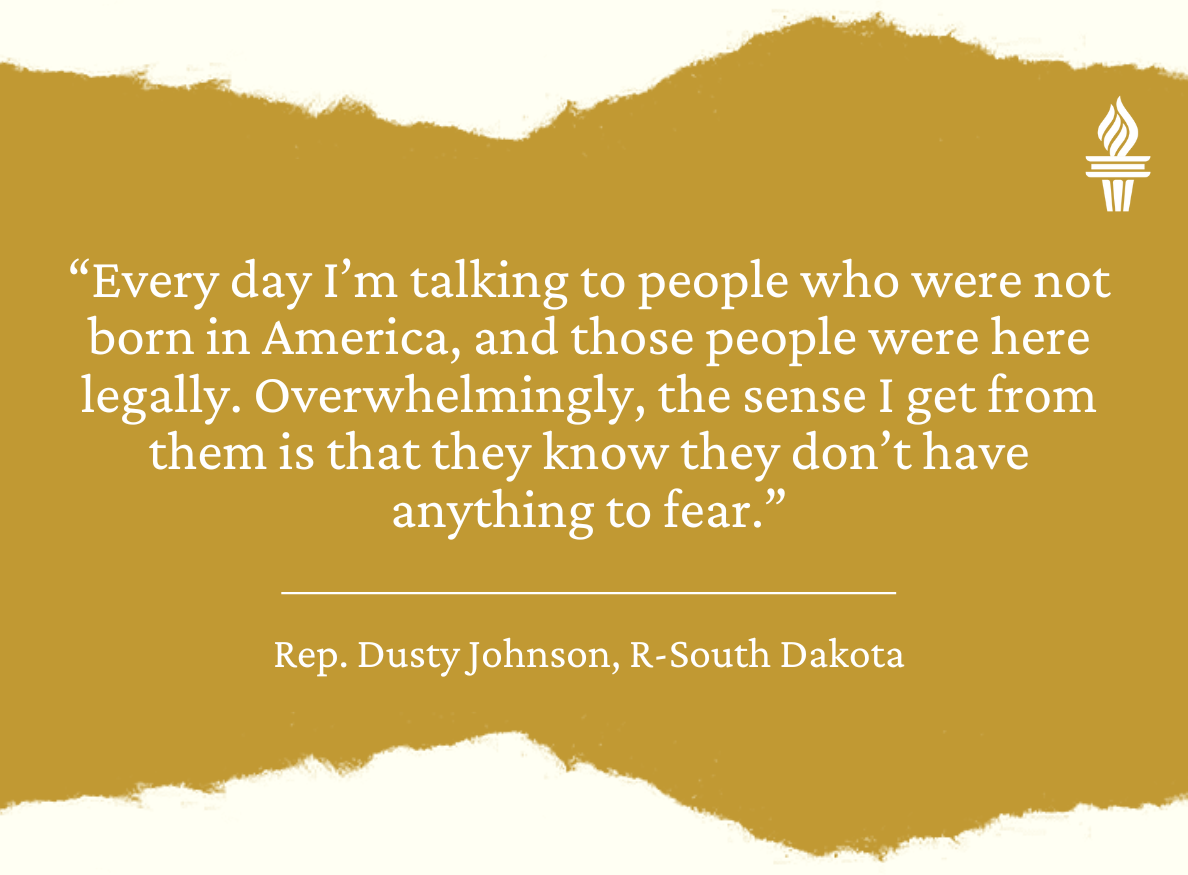South Dakota U.S. Rep. Dusty Johnson has a front-row seat in Congress to all the changes accompanying the new White House resident down the street on Pennsylvania Avenue. And he posted a photo on social media Sunday thanking President Donald Trump for inviting him to the Super Bowl.
During a visit to the Black Hills Stock Show in Rapid City a week earlier, the Republican weighed in on the top issue constituents want to talk about, why he sponsored a bill to buy back the Panama Canal, his thoughts on the presidential pardons of Capitol rioters and other issues.
Here, in his own words, are Johnson's answers, which have been edited for length.
Question: What are you hearing from your constituents in Rapid City today?
Answer: "It's still a lot about the border. I mean, really, in the last two years, that has been the dominant policy topic. People have seen how quickly things have changed. They saw that in the House. We passed the Laken Riley Act (that requires detainment of illegal immigrants who commit crimes) and then we got it signed into law by President Trump. They have seen that border crossings are fallen by two-thirds in a relatively short span of time. So I think there's some optimism around the idea that we can actually solve some of these public policy problems that were, really, the referendum that the November election turned on."
Q: What are your top priorities in the current session of the U.S. House of Representatives?
A: "I'm a big believer in work requirements. We, of course, we need to have programs that help people out when they're in trouble, when they're down and out. If you're able-bodied, you should work. ... I would tell you, also, the Chinese Communist Party is also a much bigger threat than most Americans realize. And so my bill to prohibit the Chinese Communist Party from buying American farmland, that is a real crowd-pleaser because I think everyone understands food security is national security. And there is no reason we should give an adversary control over our food supply. ... And then the border, of course."

Q: Are you concerned at all about immigration crackdowns affecting South Dakota agriculture or businesses?
A: "To the extent that there are South Dakota businesses who may be relying on the illegal labor, on labor that's not allowed to be here, they are. They are going to be impacted. Americans here illegally understand they're here illegally. I've talked to a number of folks. I mean, every day I'm talking to people who were not born in America, and those people were here legally. Overwhelmingly, the sense I get from them is that they know they don't have anything to fear."

Q: Why did you sponsor the bill to allow the U.S. to take over control of the Panama Canal?
A: "I think the president should be given the flexibility to go have the conversation. I get it, a lot of folks on the left don't like Donald Trump. I do get a little frustrated at all of the pearl clutching, the idea that it's dangerous to even have a conversation. ... It seems like some on the left are more comfortable with Chinese Communist Party influence in the Panama region than they are with American influence. ... It is an asset that is uniquely important to our country. I don't know whether buying back the canal is possible. I don't know whether it's prudent. But I don't know why we wouldn't at least evaluate whether or not there's a willing buyer, willing seller situation."

Q: How would you describe the mood in Congress now that a new president has taken office?
A: "Donald Trump said throughout the campaign that when he came to office, he was going to roll back a lot of the executive orders that Joe Biden put into place. And of course, I've grown increasingly uncomfortable with all of these executive orders that these presidents put out there because I think Congress should be making the laws. And so I think it's refreshing to see the president roll back some of these Biden executive orders, in essence undoing a wrong. ... I think that the mood in Congress is one of enthusiasm and excitement. I think we know that there is a real possibility that Congress will be able to pass legislation that secures the border and is bipartisan, and to roll back regulations. I think we will have a number of bills that roll back regulations, that will pass on a bipartisan basis, overwhelmingly. ... You get a certain amount of outrage around Donald Trump. That is indeed for political purposes rather than for legitimate policy concerns."

Q: What impact do you expect to see from Trump's plan to impose new tariffs on imports from Canada, Mexico and China?
A: "One thing that the Trump administration said, even in the information they've released to the public, they use the word 'leverage.' I think they are interested in making sure that we have, No. 1, a fair trading relationship with other countries, and, No. 2, that those countries are doing what they can to stop the flow of poison, fentanyl and (methamphetamine), into this country. And so it seems to me that the president has been very clear that these are areas where he wants to have leverage in conversations with these countries. And I do think there are ways in which targeted tariffs can be helpful in building some domestic industry. Clearly, you can overdo tariffs too. I mean, this is a policy tool that I think Donald Trump understands can be used for leverage can be used in a targeted way. Those would be the most effective ways to make sure that we make America stronger. I mean, how much did the Trump tariffs contribute to inflation in his first term? It was the lowest rate of inflation in modern economic history. The real wages were growing at twice the rate of inflation, which is remarkable. Wage growth was growing at twice the rate of inflation, and Trump certainly used tariffs in targeted ways in his first term, in ways that did not contribute to widespread inflation. Again, I think it's not to look at a tool as inherently good or inherently bad. We want to look at it like a lot of tools, which is, 'OK, how do you use this tool in the most productive way?'"
Q: How do you feel about Trump's pardon for almost all the Jan. 6, 2021, rioters who stormed the Capitol in Washington?
A: "We shouldn't be condoning violence. Clearly, I think I would view people who trespass differently than people who attack police officers. One thing we know is that the Constitution gives the president unilateral power in that way. And I was, of course, disappointed when President Biden gave a blanket and probably the most sweeping pardon in American history to his son. And so I understand why people wonder if this pardon power that we give the president and the Constitution is perhaps too broad. ... Of course, we should not condone those who commit violence against police officers. And I think Americans are right to wonder whether or not the power, the pardon power, as it exists in the Constitution, if that's a little too broad. I think what Joe Biden did with his son was concerning, and I can understand why others feel that way about the Jan. 6 pardons."

Q: What's the next step for you in your career?
A: "Let's go get the reconciliation package we're working on the House done. I mean, let's make sure we don't increase taxes on American families by $5 trillion, and let's make sure we secure the border and let's make sure we roll back regulations. There will always be time to play politics. There will be time for me to play politics down the road. I've just got to be focused on getting our job done. I mean, we are 12 days into Donald Trump's term. I think South Dakotans could rightfully be a little irritated if I was already looking toward the next election."
This story was produced by South Dakota News Watch, an independent, nonprofit organization. Read more stories and donate at sdnewswatch.org and sign up for an email to get stories when they're published. Contact Bart Pfankuch at bart.pfankuch@sdnewswatch.org.







